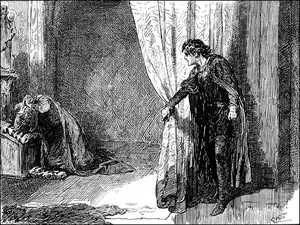
Rationalizations
 |
From Samuel Taylor Coleridge's writings in the late 18th century onward, critics have been puzzled and troubled by Hamlet's vicious reasoning as he passes up the opportunity to kill Claudius at prayer. They have seized upon a variety to rationalizations to explain it away: Hamlet seeks a more public occasion for the act, or he is loath to kill a defenseless man, or he is squeamish about killing of any kind, or, as Eleanor Prosser suggests, he is troubled by the moral and ethical injunctions against revenge. Both Prosser and Gideon Rappaport see this issue contained with Hamlet's 'to be or not to be" soliloquy in Act III, scene i. Hamlet will have to answer for this act in the afterlife.
|
Hamlet immediately reiterates his fear, now expressed as a universal one, in the "To be or not to be" soliloquy, in which he observes that it is "the dread of something after death" that keeps men from "enterprises of great pitch and moment" (III.i.55ff.) --Gideon Rappaport, Shakespeare's Problem Audience, unpublished book ms., p. 162. Is it truly nobler, Hamlet asks, to endure evil passively, as all the voices of the Church and State and society have insisted, or does the true nobility of that which is man demand that he actively fight and conquer the evils that beset him?... Can man fulfill his given nature, can he attain true nobility, solely by withdrawal and contemplation? --Eleanor Prosser, Hamlet and Revenge, Stanford Univ Press, (1971) p.164. |
As Eleanor Prosser points out, rationalization is usually a process of attributing morally acceptable motivations to unacceptable desires. This is clearly not the case with Hamlet's avowed hesitation for killing Claudius at prayer. Quite the contrary: His justification of hesitation is as much an overstepping of man's moral prerogative as revenge itself was considered to be: Hamlet states that he seeks to assure the perdition of Claudius' soul.